Key takeaways:
- Understanding different types of music licenses (synchronization, mechanical, performance, and royalty-free) is crucial for successful music-related projects.
- Common challenges include cost variability, unclear rights, geographic restrictions, and limited usage terms, highlighting the importance of preparation and knowledge.
- Negotiating licenses effectively requires clarity, the willingness to walk away, and building relationships with rights holders.
- Networking and accessing comprehensive resources, such as online courses and industry forums, can significantly enhance music licensing success.
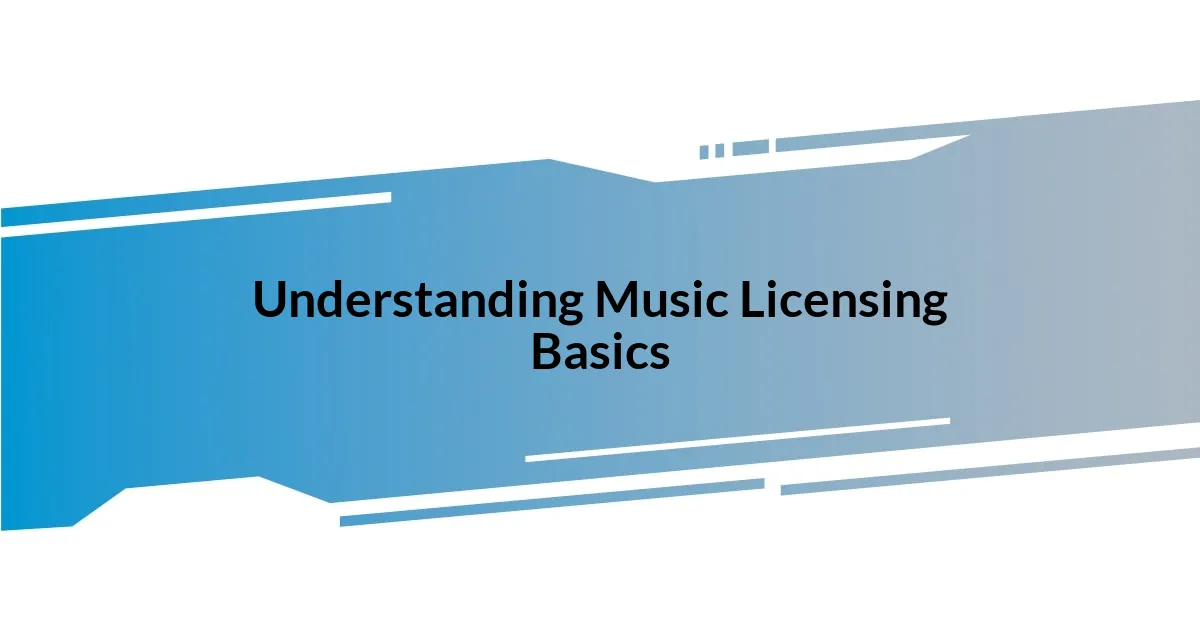
Understanding Music Licensing Basics
When I first started exploring the world of music licensing, I was overwhelmed by the legal jargon. Terms like “mechanical rights” and “synchronization licenses” sounded foreign to me. It felt like I was trying to learn a new language, and that uncertainty made me anxious about navigating my own projects.
One day, while attending a seminar on music rights, I had an aha moment when the speaker broke down the types of licenses. I realized that a synchronization license allows you to use music in videos, while a mechanical license is what you need for reproducing music on CDs or digital platforms. This distinction is crucial, and understanding it empowered me to make informed decisions for my projects.
Have you ever felt that rush of clarity when things suddenly make sense? That’s how I felt when I grasped the basics of music licensing. It changed everything for me. Armed with this knowledge, I was able to approach conversations with music publishers and artists with confidence, turning what once felt like a daunting legal maze into a pathway for creative expression.
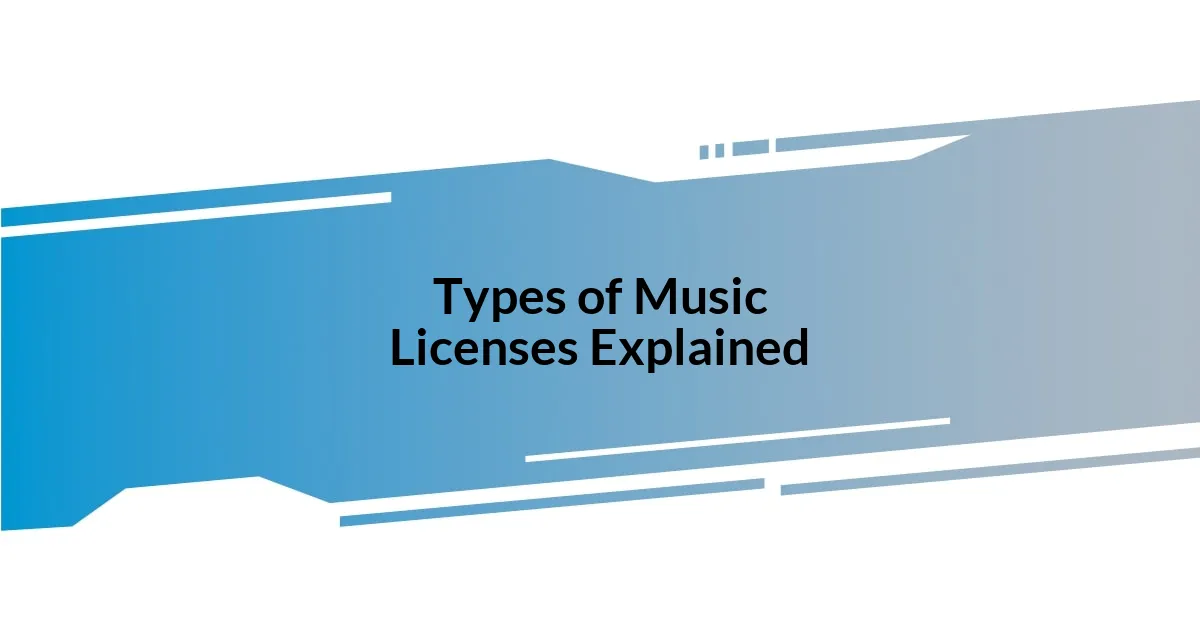
Types of Music Licenses Explained
Understanding the various types of music licenses is essential for anyone venturing into music-related projects. I remember when I was trying to source the right license for a short film. The distinction between the types seemed subtle yet significant. For instance, a synchronization license lets you pair music with visuals, which means if you’re crafting a video, this is the license you’d need. In contrast, when I wanted to press vinyl for original tracks, I had to secure a mechanical license. It was a lightbulb moment realizing that each license caters to distinct needs.
As I continued my journey, I discovered the nuances of performance licenses. When I got involved in organizing a local music event, I quickly learned that these licenses are all about playing music in public venues. The first time I tried to book a band, I left the venue unaware that a performance license was necessary. There I was, excited about the lineup, only to be hit with the reality that obtaining this license was paramount. It felt like I was stumbling through an obstacle course, but it taught me the importance of preparation and knowledge in avoiding stumbling blocks.
Finally, let’s not overlook the concept of royalty-free licenses, which I often found myself eyeing for budget projects. I experimented with a few tracks thinking they would streamline my process, but I learned that “royalty-free” doesn’t mean “free.” You often pay a one-time licensing fee, allowing for extensive use of the music without ongoing royalties. It’s a fantastic option for creators looking to streamline their projects, but it was initially confusing for me. Just navigating those waters requires a keen eye on contract details, and I can’t stress enough how imperative it is to read the fine print.
| Type of License | Purpose |
|---|---|
| Synchronization License | Pairing music with video content |
| Mechanical License | Reproducing music on physical formats |
| Performance License | Playing music in public venues |
| Royalty-Free License | Allows use of music with a one-time fee |
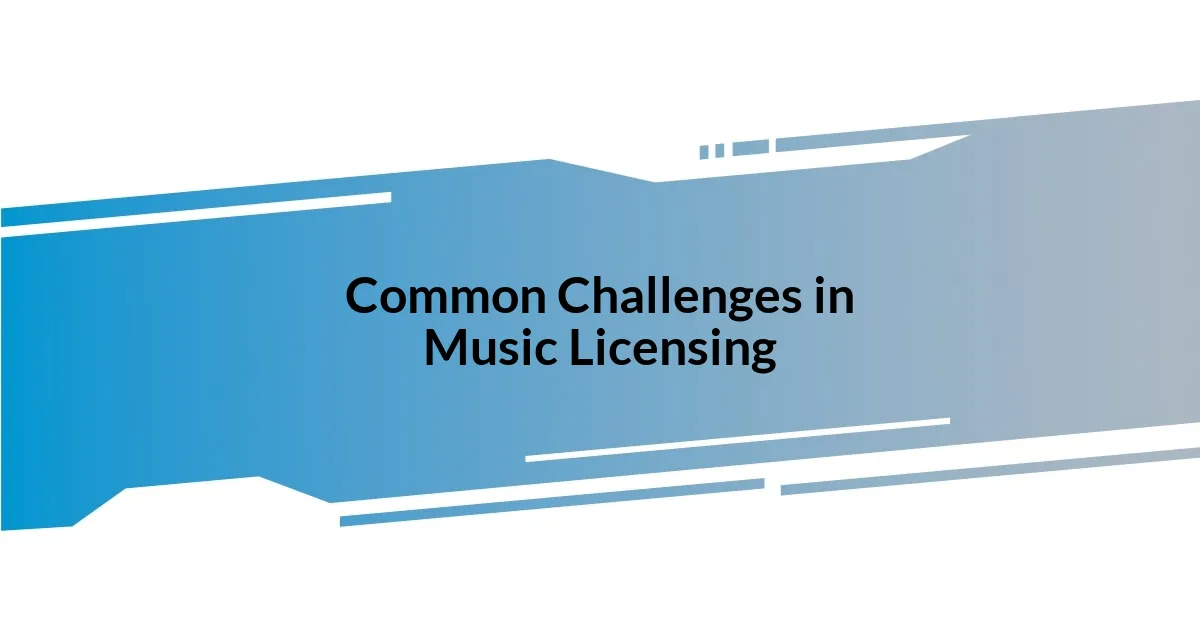
Common Challenges in Music Licensing
Navigating music licensing can feel like walking a tightrope. One of my early experiences illustrates this perfectly. I collaborated with a filmmaker who was eager to use a popular song in a promotional video. I quickly discovered that not only do you need the right licensing, but the costs can skyrocket depending on the popularity of the track. That was eye-opening for me; I learned that sometimes, the music you want can come with unexpected hurdles.
Here are a few common challenges I encountered along the way:
- Cost Variability: Licensing fees can fluctuate significantly based on the song’s popularity or the artist’s fame.
- Unclear Rights: Artists and record labels sometimes have overlapping rights, leading to confusion about who to contact for permissions.
- Geographic Restrictions: Some licenses may not be valid in all regions or countries, complicating international projects.
- Time-Consuming Negotiations: The back-and-forth involved in securing licenses can be frustrating and delayed projects.
- Limited Usage Terms: The fine print may restrict how or where the music can be used, making it essential to read everything thoroughly.
There were moments when the licensing process felt more complex than I anticipated. I remember securing a license for an indie music festival I organized. The last-minute realization that I needed multiple performance licenses for various artists was a sobering wake-up call. I felt the pressure mounting as I raced against time to align everything and ensure compliance. It highlighted the necessity of planning ahead and being proactive, rather than reactive. In my experience, learning to juggle these elements is vital for anyone serious about entering the music licensing landscape.
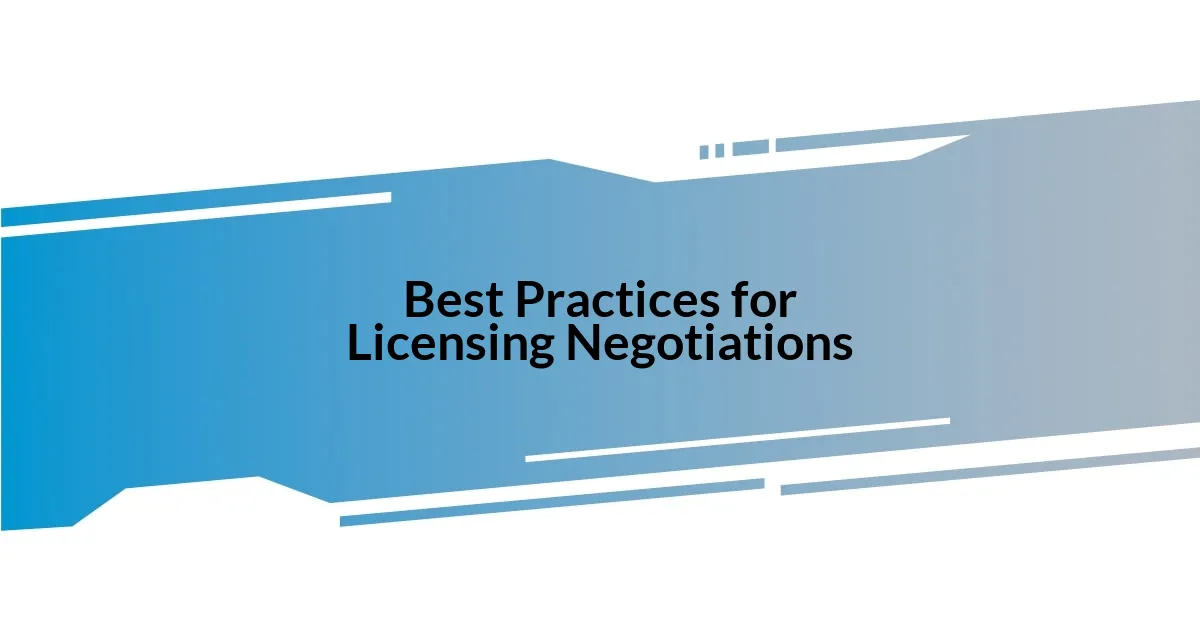
Best Practices for Licensing Negotiations
When it comes to negotiating music licenses, clarity is your best friend. I remember once sitting across from a music library representative, overhearing some convoluted terms tossed around, and I couldn’t help but wonder: What exactly do they mean by ‘exclusive rights’? It dawned on me that I needed to ask for definitions and implications of every term that sounded ambiguous. I learned that being clear about what you want—be it duration, usage rights, or geographical reach—can drastically streamline negotiations and prevent future headaches.
Another crucial best practice I’ve found is to always be prepared to walk away. There was a time when I was set on using a specific track for a project. However, the price they quoted felt excessive given my budget constraints. In that moment, I knew I had to evaluate my options—and thankfully, I did. By researching alternative tracks and understanding the value of my project without that specific song, I went back to the negotiation table with a stronger position. It’s a powerful tactic; sometimes, you have to be willing to say no to find the right yes.
Lastly, I can’t stress enough the importance of building relationships with rights holders. The industry can feel transactional, but I learned from experience that getting to know the people behind the music creates a more collaborative atmosphere. I remember having a casual chat with a publisher during a conference that unexpectedly led to a fruitful partnership later on. That personal connection made the negotiation smoother and more enjoyable. It’s a reminder that at the end of the day, music is about building connections—both through the notes and the conversations we have while licensing them.
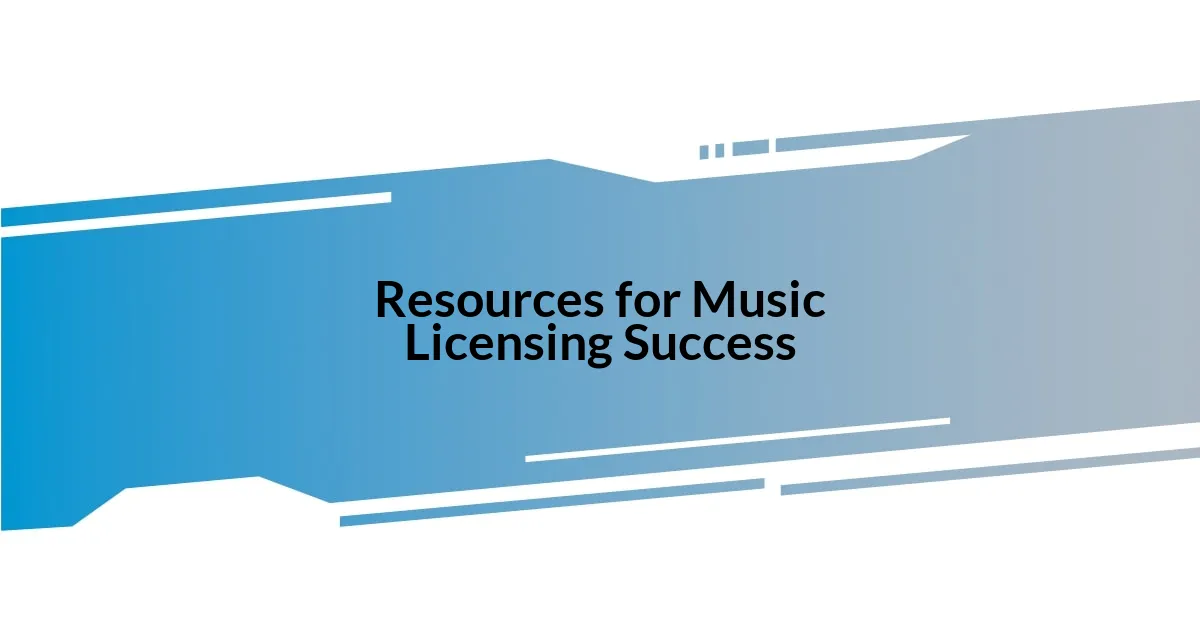
Resources for Music Licensing Success
Finding trustworthy resources for music licensing success can be paramount. I remember the first time I stumbled upon a comprehensive online course about music rights—what a revelation! The course not only covered essential concepts but also provided case studies that illustrated real-world applications. It made me realize just how invaluable formal education can be in navigating the complex world of licensing. Have you ever thought about how much easier it could be with a structured learning module at your fingertips?
Networking with industry professionals also played a pivotal role in my journey. I attended a few music business conferences, and let me tell you, I walked away with more than just business cards. Just one meaningful conversation with an experienced music supervisor opened my eyes to negotiating strategies I had never considered. Isn’t it fascinating how a brief interaction can lead to a treasure trove of insights? Sometimes, the best resources are the people you meet along the way.
Don’t underestimate the power of online forums and communities, either. I found immense support through platforms like LinkedIn and dedicated Facebook groups. In one instance, a fellow member shared a template for a licensing agreement that saved me a ton of time! In these communities, you can ask questions, share experiences, and receive tips from those who’ve been down the licensing road before. Building a network of like-minded individuals can make all the difference, don’t you think? Having collective wisdom at your disposal builds confidence as you tackle your own licensing challenges.
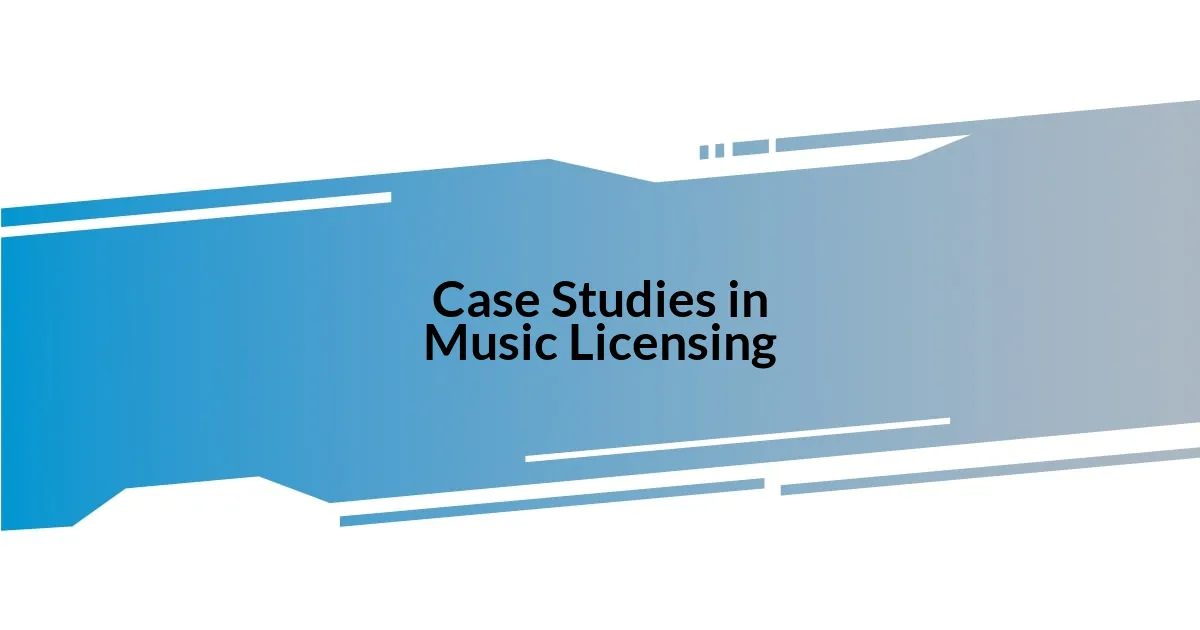
Case Studies in Music Licensing
One project that stands out was when I licensed a track for a documentary. I approached a well-known indie artist whose work I deeply admired. At first, I was anxious about pitching my project to someone so established. To my surprise, when we connected over a shared passion for storytelling through music, it opened up a dialogue that led to an agreement. That experience taught me the importance of finding common ground—it’s incredible how passion can drive decisions and lead to unexpected collaborations.
In another instance, I faced a tricky situation while working on a commercial. I had cleared the use of a specific song, but during the final review, I found out that the licensing terms had changed unexpectedly. I remember feeling a mix of frustration and determination—I had to explore my options quickly. I reached out to the licensing team, explained my situation candidly, and ended up negotiating a reasonable alternative. It reaffirmed my belief that open communication is vital; sometimes, mere honesty can unveil solutions where you least expect them.
One of the most illuminating case studies I encountered was a small film that became a festival darling, largely due to its extraordinary soundtrack. The filmmaker shared how they cautiously approached licensing, aiming for lesser-known artists to save costs—an experience that underscored creativity in the process. Isn’t it amazing how sometimes the best results come from unconventional choices? That resonated with me; it reinforced my understanding that thinking outside the box can lead to exceptional creative outcomes, even when navigating the complexities of music licensing.